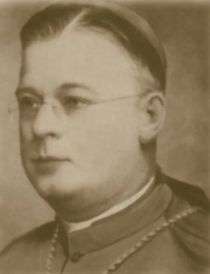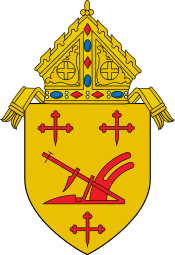Francis Beckman
| Most Reverend Francis J. L. Beckman, STD | |
|---|---|
| Archbishop of Dubuque | |
 | |
| Church | Roman Catholic Church |
| See | Dubuque |
| In office | January 17, 1930 – November 11, 1946 |
| Predecessor | James John Keane |
| Successor | Henry Rohlman |
| Orders | |
| Ordination | June 20, 1902 |
| Consecration |
May 1, 1924 by Henry K. Moeller |
| Personal details | |
| Born |
October 25, 1875 Cincinnati, Ohio |
| Died |
October 17, 1948 (aged 72) Chicago, Illinois |
| Previous post | Bishop of Lincoln |
| Ordination history of Francis Beckman | |
|---|---|
Episcopal consecration | |
| Principal consecrator | Henry Moeller |
| Date of consecration | May 1, 1924 |
Bishops consecrated by Francis Beckman as principal consecrator | |
| Louis Benedict Kucera | October 28, 1930 |
Francis Joseph Beckman (October 25, 1875 – October 17, 1948) was an American prelate of the Roman Catholic Church. He served as Bishop of Lincoln (1924–30) and as Archbishop of Dubuque (1930–46).
Early life and Ministry
Francis Beckman was born in Cincinnati, Ohio, to Francis and Elizabeth (née Fenker) Beckman.[1] He studied at St. Gregory's Preparatory Seminary and Mount St. Mary's Seminary in Cincinnati, at the University of Louvain in Belgium, and at the Pontifical Gregorian University in Rome.[1] He was ordained to the priesthood on June 20, 1902.[2] Following his ordination, he received a Licentiate of Sacred Theology (1907) and later a Doctor of Sacred Theology (1908) from the Gregorian.[1]
After his return to Cincinnati, Beckman joined the faculty of Mount St. Mary's Seminary, where he served as professor of philosophy and dogmatic theology (1908–12).[1] He was rector of Mount St. Mary's from 1912 to 1924.[1] He also served as Censor Librorum and a consultor for the Archdiocese of Cincinnati.[1]
Bishop of Lincoln
On December 23, 1923, Beckman was appointed the fourth Bishop of Lincoln, Nebraska, by Pope Pius XI.[2] He received his episcopal consecration on May 1, 1924 from Archbishop Henry Moeller of Cincinnati. Bishops Joseph Schrembs of Cleveland and Joseph Chartrand of Indianapolis were the principal co-consecrators.[2] He served the diocese for almost six years. During his time in Lincoln he served as apostolic administrator of the Diocese of Omaha from June 1926 – July 1928.
Archbishop of Dubuque
Pope Pius XI appointed Bishop Beckman Archbishop of Dubuque on January 17, 1930. Beckman shepherded the church through the Great Depression and World War II. During his tenure as archbishop the St. Vincent de Paul Society, the Holy Name Societies, National Catholic Rural Life Conference, Conference on Industrial Relations, and the Catholic Youth Organization grew with his support. The Catholic Student's Mission Crusade, which he founded while in Cincinnati, held its 1935 convention in Dubuque.[3] In 1939 the archdiocese's Columbia College in Dubuque was renamed Loras College in honor of Dubuque's first bishop Mathias Loras.
Beckman began a campaign against swing music in 1938. He made headlines when he spoke before the National Council of Catholic Women in October and openly denounced it as "a degenerated musical system... turned loose to gnaw away the moral fiber of young people" which would lead one down "primrose path to Hell."[4]
Beckman adopted a pacifist stance in the years before World War II.[5] He wrote an open letter to Senator William Borah of Idaho encouraging him in his efforts to maintain American neutrality. At a rally on October 20, 1939, Beckman supported noted radio priest Father Charles Coughlin in his stand for peace. The next week he went on the radio with Coughlin and said that the Communists wanted the U.S. to enter the war so that worn out by the war, it would be more susceptible to communist thought.[3] He made numerous speeches against U.S. involvement in the war until Pearl Harbor was attacked by the Japanese.
Impressed with Catholic culture he had seen in Europe, Beckman began to collect fine art pieces starting with a small collection of artifiacts belonging to Father William Kessler at Columbia Academy in Dubuque. He had placed a number of art pieces in a museum that was created at Columbia (now Loras) College with the assistance of the Midwest Antiquarian Association. This collection had included works of some of the best artists over the past few centuries including Winslow Horner, Rembrandt, Rubens, and Van Dyck. The collection was estimated to be worth 1.5 million dollars.[3]
In 1936 Archbishop Beckman was introduced to the idea of investing borrowed money in gold mines by Phillip Suetter of California. He perhaps thought that he could gain funds to further his art collection. Instead Beckman had involved the archdiocese in what turned out to be a dubious gold mine scheme. Beckman signed promissory notes on behalf of the archdiocese, which caused financial problems for the archdiocese when the scheme fell apart and Suetter was arrested. President Franklin Roosevelt directed the FBI to investigate Beckman to determine the extent of his involvement in this financial scheme, not because of Beckman's opposition to the president as some believed. Soon the holders of the notes began demanding repayment. Most of Beckman's collection was sold to pay off the notes. The cost to the archdiocese was over half a million dollars.
As a result of all of Beckman's problems, Bishop Henry Rohlman of Davenport was transferred to Dubuque to serve as coadjutor archbishop and apostolic administrator. Beckman was allowed to retain his title as Archbishop of Dubuque, but it was made clear to him that actual authority rested with Rohlman.[3]
Later life and Death
Archbishop Beckman remained Archbishop of Dubuque until Pope Pius XII named him Titular Archbishop of Phulli and he retired on November 11, 1946. Following retirement, Beckman left Dubuque and moved to Cincinnati.
Beckman died at the Alexian Brothers Hospital in Chicago, Illinois, at age 72. He was buried in the mortuary chapel of Saint Raphael's Cathedral in Dubuque.
References
- 1 2 3 4 5 6 Curtis, Georgina Pell (1961). The American Catholic Who's Who. XIV. Grosse Pointe, Michigan: Walter Romig.
- 1 2 3 "Archbishop Francis Joseph Beckman". Catholic-Hierarchy.org. David M. Cheney. Retrieved 21 January 2015.
- 1 2 3 4 http://www.encyclopediadubuque.org/index.php?title=BECKMAN%2C_Francis_J.L.
- ↑ http://www.newspaperarchive.com/DailyPerspectiveFullView.aspx?ViewDate=10/25/2007
- ↑ Justus D. Doenecke (2003). Storm on the Horizon: The Challenge to American Intervention, 1939–1941. Rowman & Littlefield. ISBN 0-7425-0785-8.
External links
| Catholic Church titles | ||
|---|---|---|
| Preceded by James Keane |
Archbishop of Dubuque 1930–1946 |
Succeeded by Henry Rohlman |
| Preceded by Charles Joseph O'Reilly |
Bishop of Lincoln 1923–1930 |
Succeeded by Louis Benedict Kucera |


